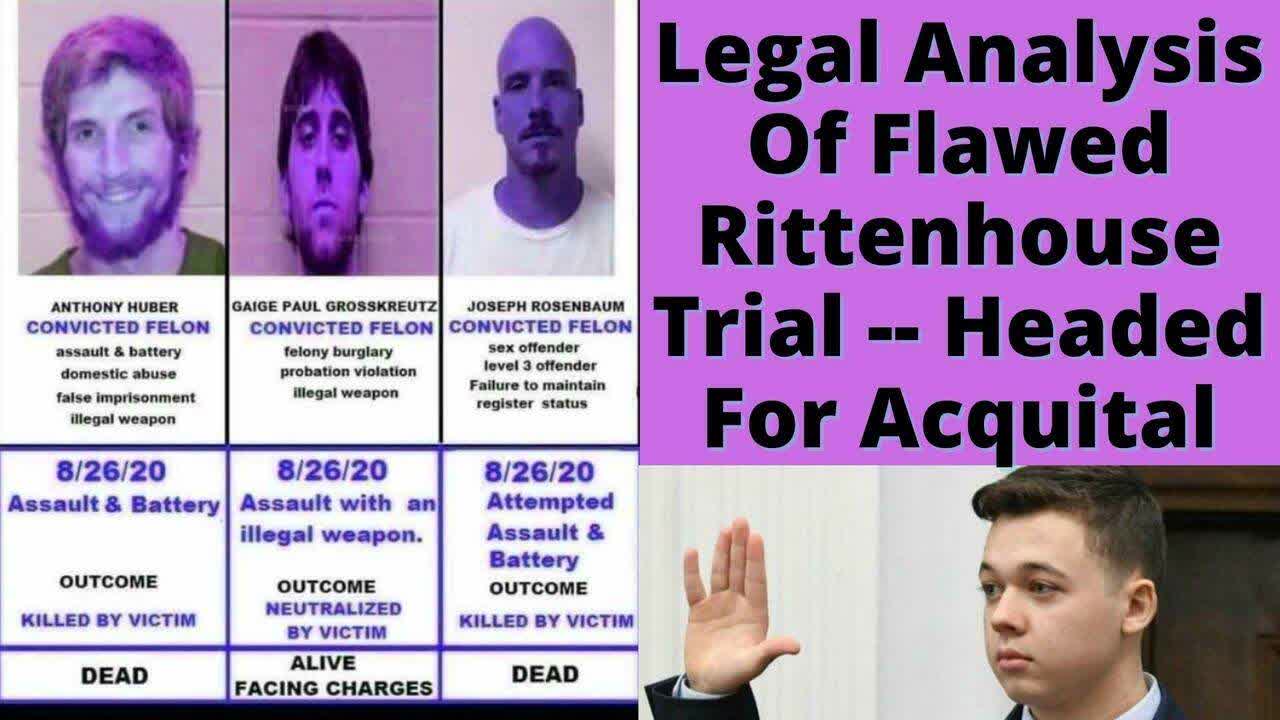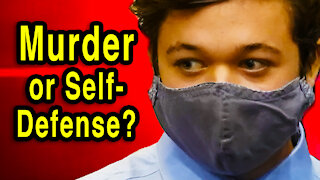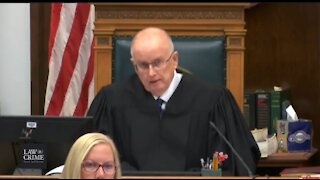Premium Only Content

Kyle Rittenhouse Legal Analysis on Murder Charge
Not Beyond Reasonable Doubt: Kyle Rittenhouse Legal Analysis on Murder Charges
Having paid any attention to WI State's Murder Prosecution of Kyle Rittenhouse, what percent of viewers believe him guilty of first degree murder? Well, and this might come as a shock – it all depends upon your political persuasion. But, putting aside one's party, it's obvious WI State has some serious problems getting a Murder conviction on Kyle. This is why they asked that lesser charges be considered.
The following are Kyle's charges:
Count 1: First-degree reckless homicide, use of a dangerous weapon
Count 2: First-degree recklessly endangering safety, use of a dangerous weapon
Count 3: First-degree recklessly endangering safety, use of a dangerous weapon
Count 4: First-degree intentional homicide, use of a dangerous weapon
The reason WI State will not get Kyle on First Degree Murder can be summarized easily. First, none of the killings by Rittenhouse appears premeditated, or decided upon before the act – a prerequisite for Murder 1. Second, he was also provoked. In all the killings he reacted to parties moving to grab his gun and other actions, like being hit with a heavy object. Joseph Rosenbaum actually stated he wanted to kill Kyle and others, before chasing him and grabbing at his rifle: “He screamed, 'If I catch any of you f---ers alone, I’m going to f------ kill you," & "He said, 'I'm going to cut your f------ hearts out.' " & "I never wanted to shoot Mr. Rosenbaum. He was chasing me. I was alone, he threatened to kill me earlier in that night. I didn't want to have to shoot him." Angry and self-righteous convicted child sodomist Rosenbaum went up to the patriots stating, “Shoot me, n*****, shoot me!!”
Anthony Huber sprinted from the curb towards Kyle then tried to slam his head with a large skateboard, before grabbing at his gun, only to then be shot once. Gaige Grosskreutz simultaneously approached Kyle, grabbed at his rifle, then pulled a pistol and stuck it in his face. “In a video showing the moments just before the shooting, Grosskreutz can be seen crouched over with his hands in the air. Rittenhouse said he’d been attacked by several people by that point and believed Grosskreutz “decided to come and point a gun at my head.” ” Now, to get a feel for how the Wisconsin Statutes reads on these law (with some parts excised):
WI CODE 940.01 First-degree intentional homicide.
(1) Offenses.
(a) Except as provided in sub. (2), whoever causes the death of another human being with intent to kill that person or another is guilty of a Class A felony.
(2) Mitigating circumstances. The following are affirmative defenses to prosecution under this section which mitigate the offense to 2nd-degree intentional homicide under s. 940.05:
(a) Adequate provocation. Death was caused under the influence of adequate provocation as defined in s. 939.44.
(b) Unnecessary defensive force. Death was caused because the actor believed he or she or another was in imminent danger of death or great bodily harm and that the force used was necessary to defend the endangered person, if either belief was unreasonable.
(c) Prevention of felony. Death was caused because the actor believed that the force used was necessary in the exercise of the privilege to prevent or terminate the commission of a felony, if that belief was unreasonable.
(d) Coercion; necessity. Death was caused in the exercise of a privilege under s. 939.45 (1).
(3) Burden of proof. When the existence of an affirmative defense under sub. (2) has been placed in issue by the trial evidence, the state must prove beyond a reasonable doubt that the facts constituting the defense did not exist in order to sustain a finding of guilt under sub. (1).
940.02 First-degree reckless homicide.
(1) Whoever recklessly causes the death of another human being under circumstances which show utter disregard for human life is guilty of a Class B felony.
Generally, to illegally commit a crime, a person must seek to do so, or be so negligent or reckless, that the outcome is not unlikely. For a defense, a problem with proving all the elements of the crime must arise, or a legal defense must be established. For example, a legal defense to murder is plausible self-defense.
Now to convict a defendant, a prosecutor should “prove beyond a reasonable doubt” that the person most likely did the crime accused. This standard is well above a preponderance of evidence of the civil trial, which just demands a 51% odds. Fascinatingly, the origin of the idea behind, 'Beyond a Reasonable Doubt' came from an medieval English Society that was so Christian-minded that they resisted judging anyone, so as not to bring down God's judgment upon themselves. See The Origins of Reasonable Doubt: Theological Roots of the Criminal Trial.
But when Rittenhouse's trial commenced, it became clear early that WI State could not prove any premeditation for Kyle. Further, it then became disastrously obvious that the one living person shot by Rittenhouse – Gaige Grosskreutz, admitted he was shot by Kyle only after pointing a pistol at him. And for Huber, he hit him with a skateboard before trying to wrest away his arms. Then Rosenbaum, child rapist – bragged he would murder Kyle. So all the “victims” of Kyle had either assaulted him or bragged of seeking his murder. And all that is needed is for Kyle to have reasonably felt his life was in danger and so to save himself he would be justified to respond with deadly force.
Now, regarding the fact Defense allowed Rittenhouse to testify, it was a great decision. Rittenhouse came across as honest, smart, thoughtful and regretful for what he felt he had to do. He also had clearly thought through his actions, and how his testimony came across was compelling. Undoubtedly any lesser crimes will also be made much less likely because of Kyle's winning testimony.
What is normally overlooked his how often juries come to conclusions in cases. Much like deciding on whether you like a person you meet, juries also hone in on whether they feel the accused is a nice person or is sympathetic. This can give the edge to a close trial. In this case, Kyle seemed honest, earnest and good-hearted, and this will no doubt play very well with whether his testimony was believed. It seems when you combine good facts and testimony for Kyle and bad facts and horrible admissions by the State's witnesses, it almost seems like a slam-dunk for Rittenhouse. But the jury has their own secrets and logic, and we can't assume anything until the last juror shares their verdict.
-
 7:29
7:29
Eric Deters Media
3 years ago $0.39 earnedRittenhouse Trial Legal Analysis
540 -
 1:09
1:09
Newsy
3 years agoJudge Dismisses Weapons Charge In Kyle Rittenhouse Murder Trial
2.86K2 -
 13:28
13:28
Matt Orfalea
3 years agoKyle Rittenhouse | Murder or Self-Defense?
40.8K209 -
 1:20
1:20
Mr Producer Media
3 years agoJudge Dismisses Gun Charge Against Kyle Rittenhouse
1.04K2 -
 0:52
0:52
The Post Millennial Live
3 years agoCNN legal analyst calls Kyle Rittenhouse an "idiot"
6.48K19 -
 1:40:45
1:40:45
Matt Orfalea
3 years agoKyle Rittenhouse Murder Case TRUTH w\ Nate the Lawyer!
6.82K -
 5:30
5:30
The Clay Travis & Buck Sexton Show
3 years agoJudge Throws Out Gun Charge Against Kyle Rittenhouse
5542 -
 9:31
9:31
WTMJMilwaukee
3 years agoClosing arguments begin at murder trial of Kyle Rittenhouse
264 -
 1:25
1:25
Newsy
3 years agoJury Selection Underway For Murder Trial Of Kyle Rittenhouse
9864 -
 2:45
2:45
Newsy
3 years agoState Formally Rests Its Case In Kyle Rittenhouse Murder Trial
2.88K40